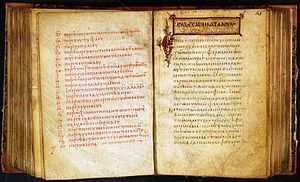The Gospel of Luke begins with words that many have understood to be an assurance that its narrative is based on the firsthand eyewitness testimony of those who had seen Jesus for themselves. Here is Craig S. Keener‘s rendition of Luke 1:1-2
. . . many have sought to complete a narrative of the acts fulfilled in our midst, just as those who were eyewitnesses and servants of the message have from the beginning transmitted them orally to us. (from the header to chapter 10, “The Gospels’ Oral Sources”, in The Historical Jesus of the Gospels, 139)
Keener captures the meaning Richard Bauckham imputes to the term “eyewitnesses” in Jesus and the Eyewitnesses
The autoptai [eyewitnesses] are simply firsthand observers of the events. (p. 117)
Now . . . we have discovered how important was the notion of an eyewitness who was qualified to tell the whole gospel story by virtue of participation in it from beginning to end . . . . (p. 124)
John N. Collins, in a 2010 Expository Times article, ‘Re-thinking “Eyewitnesses” in the Light of “Servants of the Word” (Luke 1:2)’ on the other hand, has cogently argued that the term translated “eyewitnesses” in Luke 2 almost certainly means something quite different from this widely-embraced view, and after 2 1/2 years Richard Bauckham has still to find time to respond. One scholar who has noticed Collins’ article is Thomas L. Brodie. He cites it six times in Beyond the Quest for the Historical Jesus. (For info on John Collins see his details at the end of his review on Catholica.)

Collins closely examines the context of the word for eyewitnesses in Luke 1:2 and concludes it refers to officers of long-standing in the Christian community. At this point it is important to recall the opening words of Luke’s preface:
Since many have undertaken to set down an orderly account of the events that have been fulfilled [peplērophorēmenōn] among us, 2 just as they were handed on to us by those who from the beginning were eyewitnesses and servants of the word, 3 I too decided, after investigating everything carefully from the very first, to write an orderly account for you [NRSV]
Given that the opening verses are about literary activity, and the close association of the “autoptai” with “servants”, Collins further concludes that their role was related to the authentication of the documents accumulated from those many literary endeavours.
The word in question is found only once in the New Testament so there are no other biblical comparisons that can assist us with its meaning. The essence of Collins’ argument follows. (In all quotations the bolding is my own, not original.)
Eyewitnesses are also the Servants of the Word “From the Beginning”
First, Collins draws attention to the word order of the Greek. He sets out the above NRSV translation the following word order to reflect the Greek:
the from beginning eyewitnesses and servants being of the word
Servants and eyewitnesses are bracketed as a unit between “the” and “being/genomenoi“. It is clear that the two terms, eyewitnesses and servants, are to be understood as the one and same group with the same dual functions — eyewitnessing and serving — from the beginning. Continue reading “What Did Luke’s Eyewitnesses See?”
